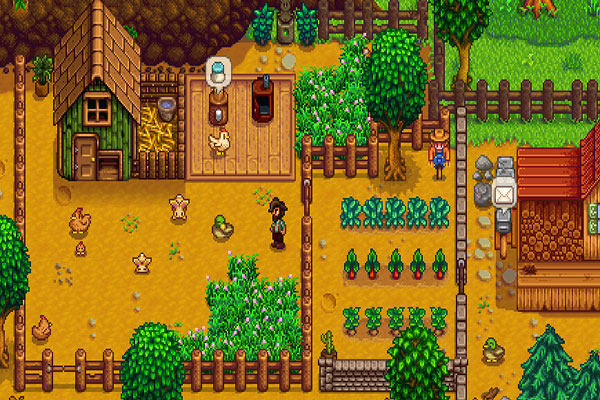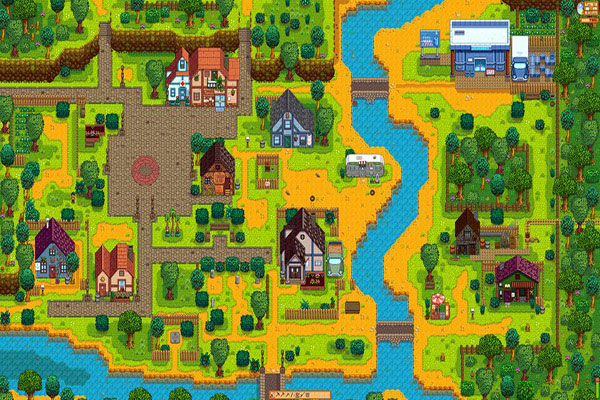Get up, eat, do your work, find time to socialize, go to sleep. Get up, eat, do your work, find time to socialize, go to sleep. Get up, eat, do your work, etc, etc, etc.
No this isn’t a vague description of the average life of the average person, this is the loose strategy guide for one of the greatest indie games in years: Stardew Valley.

Stardew Valley is a fairly unabashed, unofficial continuation of the classic game series Harvest Moon. Much like in that game, your job is to turn a lowly piece of land into a thriving farm while making yourself known in town and perhaps even finding a spouse or some adventures. What that means from a gameplay standpoint is a considerable amount of chores. You’ll need to milk the cows, till the land, plant some seeds, craft items, spruce up your home…even the game’s social elements are basically a series of minor tasks designed to turn strangers into friends and lovers. Now, I’m sure this all sounds very boring and, to be quite honest, there are times when it can be.
But what keeps Stardew Valley from surrendering to monotony so easily is the game’s sense of discovery. Your very first actions are once completed at the game’s request, but from there every single action you perform suddenly leads you to five others. While some are simple such as setting up a chicken coop to collect eggs or helping to rebuild the town’s community center, others are much more fantastic adventures that will see you fighting monsters in a cave or researching mystical town legends.

What’s so fascinating about this dynamic is the way that Stardew Valley asks you to balance your time between the more incredible quests you can engage upon and the more humble tasks which must be completed daily. Since you only have a limited amount of time to complete everything early on, trying to really explore the considerable depths of the game and the adventures they can yield require you to do so while balancing your daily work. What this leads to is the kind of hyper-efficient daily management that you’ll wish you had in your own life. Trying to get the farm running largely on its own while you pursue more elaborate matters can easily absorb hours of your life.
Ultimately, though, what makes Stardew Valley so special is the love that went into it. Made largely by one man (Eric Barone) it is clear that every character and setting in the game was crafted with genuine passion. Playing Stardew Valley is like looking at your child’s school drawings if your child’s school drawings happened to be genuine works of art. The further and further you get into the game’s near infinite depths, you’ll find reason to say “I can’t believe you did this. This is incredible.”
Stardew Valley’s perfectly honed gameplay would be enough to make it easy to recommend, but that contagious feeling of joy embedded deep within the game is what makes it one of the best games of the year. Whether you choose to approach the game with mathematical perfection or simply wish to let its wonders come to you as they may, Stardew Valley is an incredible celebration of the joys of gaming that is sure to keep you glued to your computer for months.
Pros:
- Endless amount of things to do
- Rock solid gameplay mechanics
- Charming visual style
- Any style of play can become addictive
- Community mods ensure future of content
Cons:
- Can get a little repetitive sometimes
- Starting out can be overwhelming without some guides
End Score: 9/10
